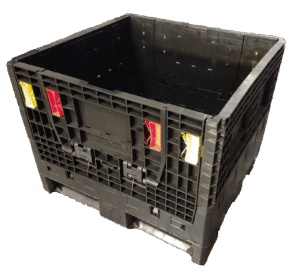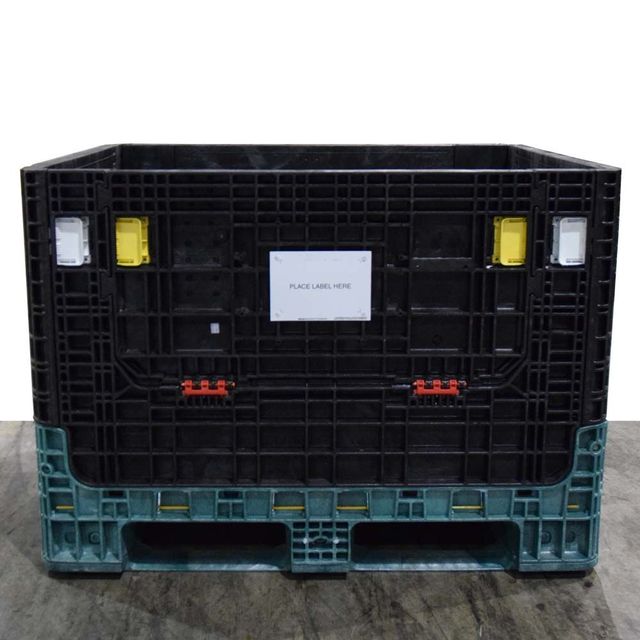The Ultimate Guide to Picking the Right Bulk Containers for Your Business Needs
Picking the suitable mass containers is crucial for any company that relies on effective logistics. Different kinds of containers exist, each designed for certain materials and applications. Aspects such as size, material compatibility, and governing requirements play a considerable duty in this decision-making process. Understanding these elements can lead to boosted operational effectiveness. Numerous companies neglect important elements that might improve their total efficiency and sustainability. What are these factors to consider?
Understanding Various Kinds of Mass Containers
Bulk containers work as necessary devices for businesses looking for reliable storage and transportation remedies. These containers come in different types, each designed to fulfill specific functional demands. One common type is the intermediate bulk container (IBC), which is optimal for fluid and granulated materials, offering an equilibrium of capability and ability to move. One more prominent option is the mass bag, or FIBC, suitable for dry, flowable items. These adaptable containers are lightweight and can be quickly delivered and kept. For much heavier materials, stiff mass containers are frequently utilized, offering longevity and security for safe handling. Furthermore, there are specific containers tailored for unsafe products, guaranteeing conformity with security guidelines. Comprehending the unique qualities of these mass container types enables organizations to make educated decisions that enhance logistics and decrease costs. By selecting the ideal container, companies can boost their functional effectiveness and streamline their supply chain procedures.
Secret Product Considerations for Mass Containers
When selecting mass containers, it is vital to contemplate the materials made use of in their construction. Elements such as toughness, longevity, and chemical compatibility play a crucial duty in making sure the containers satisfy specific functional demands. In addition, weight and portability problems can influence both performance and transportation logistics.
Material Sturdiness and Strength
Resilience and toughness are vital consider choosing materials for mass containers, as they directly affect the container's ability to withstand various ecological conditions and taking care of processes. Materials such as high-density polyethylene (HDPE), polypropylene, and stainless-steel are frequently favored for their robust buildings, supplying resistance to temperature level, influence, and abrasion fluctuations. The choice of product also impacts the total life expectancy of the container; more powerful products commonly cause much less regular replacements, resulting in set you back financial savings gradually. In addition, the weight of the material can influence shipping prices and convenience of handling. Services must consider their details operational environments and the potential for deterioration to assure peak durability and strength in their bulk container option.
Chemical Compatibility Elements
Understanding chemical compatibility is necessary for choosing mass containers, as the products used have to resist the specific compounds they will certainly hold. Different factors influence compatibility, including the chemical nature of the contents, temperature, and duration of storage space. For instance, destructive chemicals may call for containers made from stainless-steel or specialized plastics that withstand destruction. Furthermore, responsive compounds can create heat or gases, necessitating aired vent or pressure-rated containers. The option of container product, whether polycarbonate, polyethylene, or metal, must line up with the chemical homes of the stored substances to avoid breaches or leaks. Inevitably, an extensive analysis of these compatibility aspects ensures risk-free handling and storage space, shielding both employees and the environment while preserving item integrity.
Weight and Transportability Issues
Picking bulk containers involves not just assessing chemical compatibility however also considering weight and transportability. Businesses should evaluate the simplicity of handling and transportation to optimize performance. Light-weight materials like high-density polyethylene (HDPE) or aluminum can assist in simpler activity and lower delivery costs. Alternatively, much heavier containers might provide enhanced resilience yet can hinder wheelchair, particularly in settings requiring constant moving. In addition, the layout of the container must enable for practical training and stacking, making sure ergonomic security for employees. Firms ought to additionally consider the infrastructure available for transportation; for instance, containers compatible with forklifts or pallet jacks can improve procedures. Ultimately, the appropriate balance in between weight and transportability straight influences operational performance and expense effectiveness.
Sizing Your Bulk Containers for Ideal Efficiency
When sizing bulk containers, businesses must very carefully analyze the dimensions needed to suit their particular products. Furthermore, weight capability is a vital aspect that affects efficiency and security during transportation and storage space. Reliable sizing not just makes best use of space yet likewise maximizes operational workflows.
Establishing Container Dimensions
Choosing the appropriate dimensions for mass containers is important for taking full advantage of performance in storage space and transport. Companies need to examine their specific needs, considering factors such as available room, the nature of the goods being kept, and the methods of transport made use of. Exact dimensions ensure that containers fit ideally in vehicles and storage facilities, decreasing lost room and lowering handling time. Standard sizes can provide comfort, but custom-made dimensions may be required for unique demands or to accommodate particular items. Additionally, it is necessary to evaluate stacking capacities and ease of access, as these variables affect general functional efficiency. Eventually, the appropriate dimensions lead to improved company and structured logistics, profiting the overall productivity of the service.
Weight Capacity Considerations
Understanding weight capability is essential for organizations intending to optimize their mass container effectiveness. The weight capacity of a container straight impacts storage space abilities, transportation logistics, and click here total functional prices. Picking containers with the ideal weight limitations guarantees that businesses can securely store and carry their items without taking the chance of damage or conformity concerns. Overloading containers can cause structural failings, while underutilizing capability cause squandered resources. It is necessary for services to analyze their product weights and consider any kind of governing needs when selecting containers. Additionally, elements such as the sort of material, planned use, and environmental problems should likewise affect weight capacity decisions. By assessing these components, companies can enhance effectiveness and assure a structured supply chain.
Governing Compliance and Security Standards

Regulative conformity and safety standards play a necessary duty in the choice of bulk containers for organizations. Organizations has to ensure that their containers meet numerous regulations set by neighborhood, national, and worldwide authorities. These requirements often relate to material safety, structural integrity, and proper labeling, which aid avoid accidents and guarantee the risk-free transportation of items.
In addition, adherence to industry-specific guidelines, such as those from the Fda (FDA) or the Occupational Security and Health Administration (OSHA), is vital for firms dealing with dangerous materials or food. Non-compliance can cause penalties, lawful problems, or damage to a company's online reputation.
Companies ought to additionally take into consideration the container's compatibility with the materials being stored or transported to stay clear of contamination or chemical reactions (used collapsible bulk containers). To sum up, recognizing and applying governing conformity and security criteria is necessary for the accountable and efficient use bulk containers
Sustainability Options for Eco-Friendly Mass Containers

Business are also exploring options made from recycled products, which not only conserve sources yet also support the reusing market. Additionally, technologies in style permit lighter containers that call for less energy to transportation, additionally enhancing sustainability. By integrating these eco-friendly mass container options, companies can show their commitment to environmental stewardship while satisfying customer need for lasting practices. This shift not just helps the earth but can also boost brand track record and customer loyalty.
Cost-Effectiveness and Budgeting for Mass Containers
While lots of businesses focus on sustainability, cost-effectiveness remains an important aspect when selecting mass containers. Organizations has to assess the first acquisition price, in addition to long-term operational expenses, to guarantee financial stability. Factors such as upkeep, durability, and reusability play a considerable role in figuring out overall expenses.
Buying premium containers may yield higher in advance expenses yet can lead to savings with decreased substitute prices and decreased waste. Furthermore, businesses should take into consideration transport expenses and storage space efficiency, as these can affect the total budget plan.

Frequently Asked Concerns
How Do I Figure Out the Right Container for Hazardous Products?
To determine the right container for unsafe materials, one should review compatibility with the substance, consider the container's material, look for governing compliance, and examine capacity and security attributes to ensure proper handling and storage.
Can Mass Containers Be Customized for Particular Products?
Yes, bulk containers can be personalized for specific items. refurbished bulk containers. Numerous features, such as product, size, and style, can be customized to meet special demands, making certain optimal safety and security and performance for carrying and saving various items
What Is the Average Life-span of Different Bulk Container Kind?
The average life-span of mass container types differs; plastic containers last 5-10 years, metal containers 10-20 years, and wooden containers normally last 3-7 years, depending upon usage, upkeep, and ecological conditions.
Just how Should I Clean and Maintain Mass Containers?
To cleanse and maintain bulk containers, one need to frequently examine for damages, get rid of residue, laundry with ideal detergents, wash completely, and guarantee correct drying out before storage space. Following maker guidelines improves durability and safety throughout usage.
Are There Rental Choices for Bulk Containers Available?
Yes, many firms supply rental choices for mass containers, supplying flexibility for services. These leasings can suit numerous demands, allowing firms to take care of stock efficiently without the dedication of purchasing containers outright.
Toughness and stamina are crucial aspects in picking materials for bulk containers, as they straight affect the container's capability to withstand different ecological conditions and taking care of processes. Recognizing chemical compatibility is crucial for picking bulk containers, as the materials made use of should withstand the details materials they will certainly hold. Understanding weight ability is crucial for businesses intending to maximize their bulk container efficiency. Governing compliance and security criteria play a crucial role in the option of mass containers for businesses. While several companies concentrate on sustainability, cost-effectiveness remains an essential aspect when selecting bulk containers.